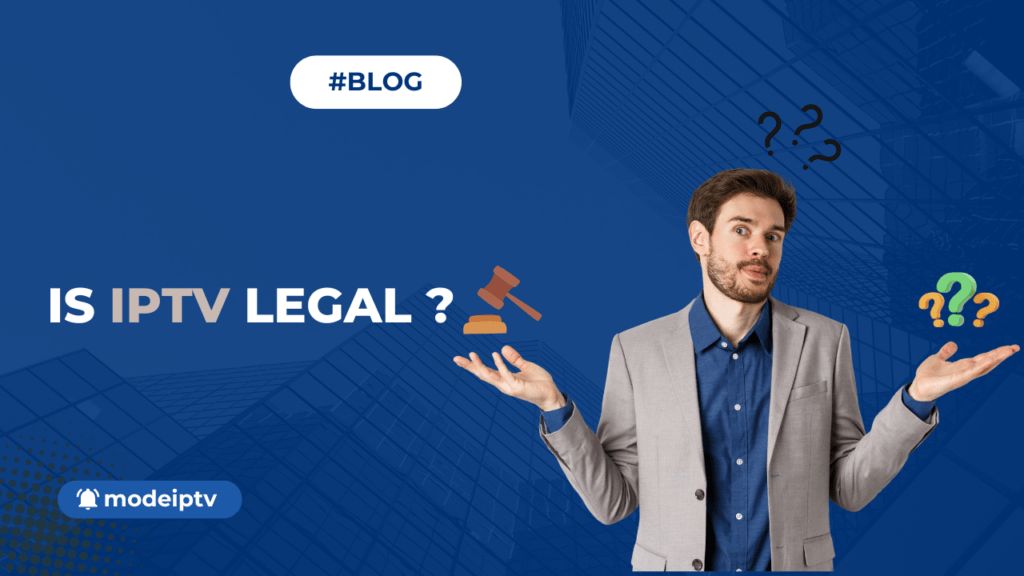Is IPTV Legal ?

Yes, Modeiptv IPTV services offer legal content and operate within the bounds of copyright law. You’ve likely heard the debate around the legality of IPTV services. While accessing licensed, subscription-based platforms is generally permissible, using services that stream copyrighted content without authorization can raise serious legal concerns. It’s important to use services that adhere to legal guidelines to avoid any potential legal issues. The regulatory landscape varies considerably across jurisdictions, making it crucial to understand the rules in your area. Navigating this complex issue requires carefully weighing the accessibility IPTV offers against the potential risks. As you delve deeper, you’ll discover the nuances that distinguish legitimate IPTV use from unlawful practices – insights that could significantly impact your choices.es.
The Legality Debate
The legality of IPTV (Internet Protocol Television) has been a subject of ongoing debate, with differing perspectives on the matter.
Some argue IPTV is entirely legal, as it allows users to access content through legitimate means like subscription-based services. Others, however, contend that certain forms of IPTV, particularly those involving the unauthorized streaming or distribution of copyrighted material, are indeed illegal.
The crux of the debate lies in the gray area surrounding the technicalities of IPTV and how it’s used.
While IPTV itself is a technology, the legality hinges on how individuals access and use the available content. If you’re tapping into licensed, subscription-based IPTV services, then it’s generally considered legal. But if you’re accessing pirated or unlicensed content, you may be treading on shaky legal ground.
Ultimately, it’s crucial to understand the nuances and ensure you’re using IPTV in a way that aligns with applicable laws and regulations in your region.
Copyright and Intellectual Property Concerns
One of the primary concerns regarding the legality of IPTV stems from copyright and intellectual property issues. You must be cautious when accessing content through IPTV, as unauthorized streaming or distribution of copyrighted material can constitute a violation of applicable laws. Many IPTV providers may not have the necessary licenses or permissions to offer certain content, and using their services could potentially subject you to legal action.
Copyright holders are vigilant in protecting their intellectual property rights, and they may pursue civil or criminal penalties against individuals who engage in unauthorized access or redistribution of their content. Even if you’re not the one hosting or distributing the copyrighted material, simply accessing it through an IPTV service could still be considered a breach of copyright law in some jurisdictions.
To avoid these legal pitfalls, it’s crucial to ensure that the IPTV service you’re using has the necessary permissions and licenses to provide the content you’re interested in. Reputable and licensed IPTV providers are your best bet to enjoy content legally and safely.
Regulatory Landscape
While the regulatory landscape surrounding IPTV can vary considerably across different jurisdictions, it’s crucial to understand the legal frameworks that govern these services in your local area.
In many countries, IPTV falls within a gray area, with some aspects being legal while others may raise legal concerns.
For instance, you may find that the distribution of licensed content through IPTV platforms is generally permitted, as long as the appropriate royalties and licensing fees are paid.
However, the unauthorized streaming or distribution of copyrighted content can often be considered a violation of copyright laws.
Similarly, the use of IPTV services to access geo-restricted content may also raise legal issues in some regions.
To ensure you’re using IPTV services compliantly, it’s essential to research the specific regulations and laws applicable in your location.
Consulting with legal professionals can also help you navigate the complex regulatory landscape and make informed decisions about your IPTV usage.
Balancing Accessibility and Legality
Balancing the desire for accessible IPTV services with the need to operate within legal boundaries can pose a complex challenge for many users. On one hand, the convenience and affordability of IPTV make it an appealing option, especially for those who may not have access to traditional cable or satellite TV.
However, the legality of certain IPTV providers and services remains a grey area, with varying laws and regulations across different jurisdictions. Users must carefully navigate this landscape, weighing the pros and cons of different IPTV options.
While some legally licensed platforms offer a wide range of content, others may operate in a legal limbo, raising concerns about the security and reliability of the service. Ultimately, it’s up to each individual to research thoroughly, understand the risks, and make an informed decision that aligns with their personal values and the applicable laws in their area.
Finding the right balance between accessibility and legality is key to enjoying IPTV without risking legal consequences.